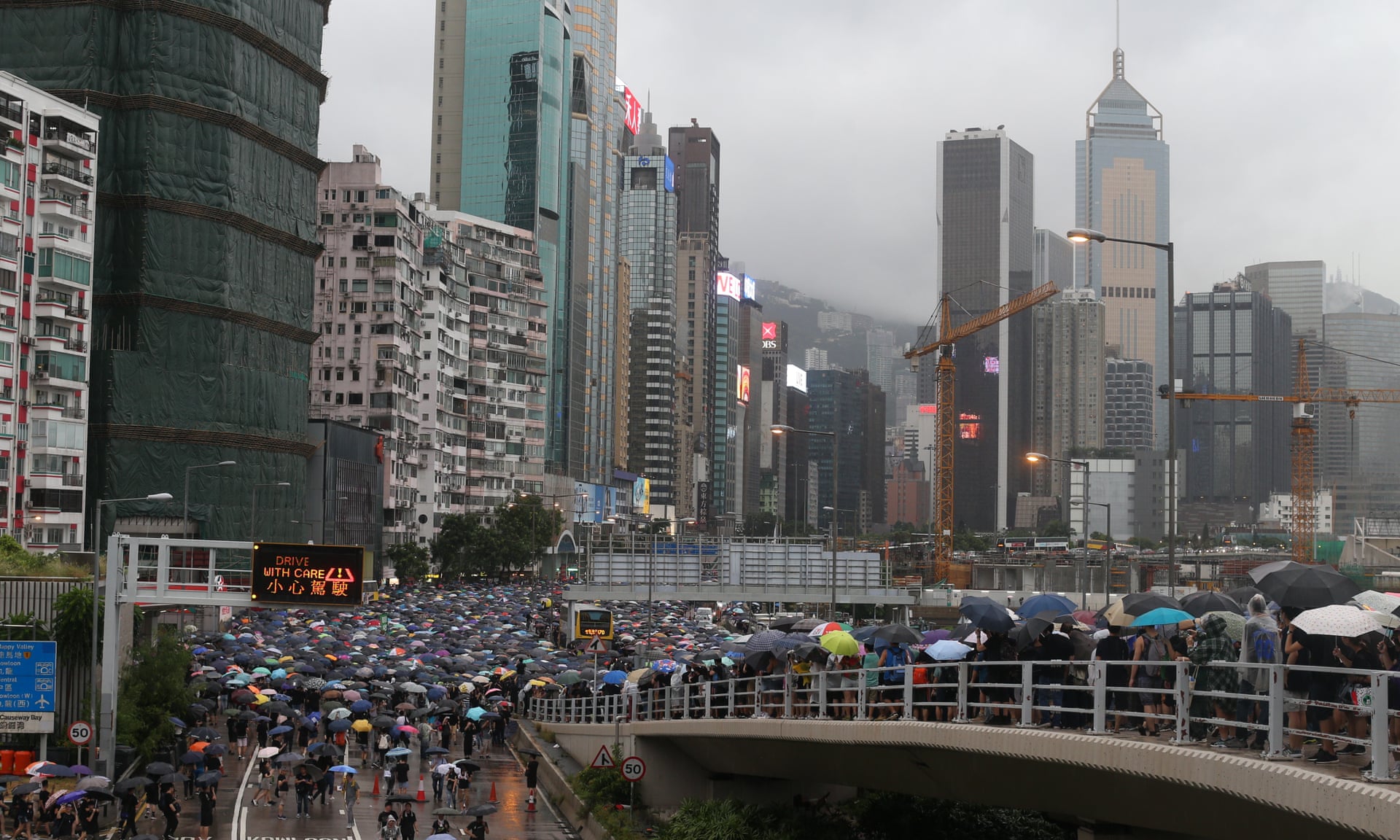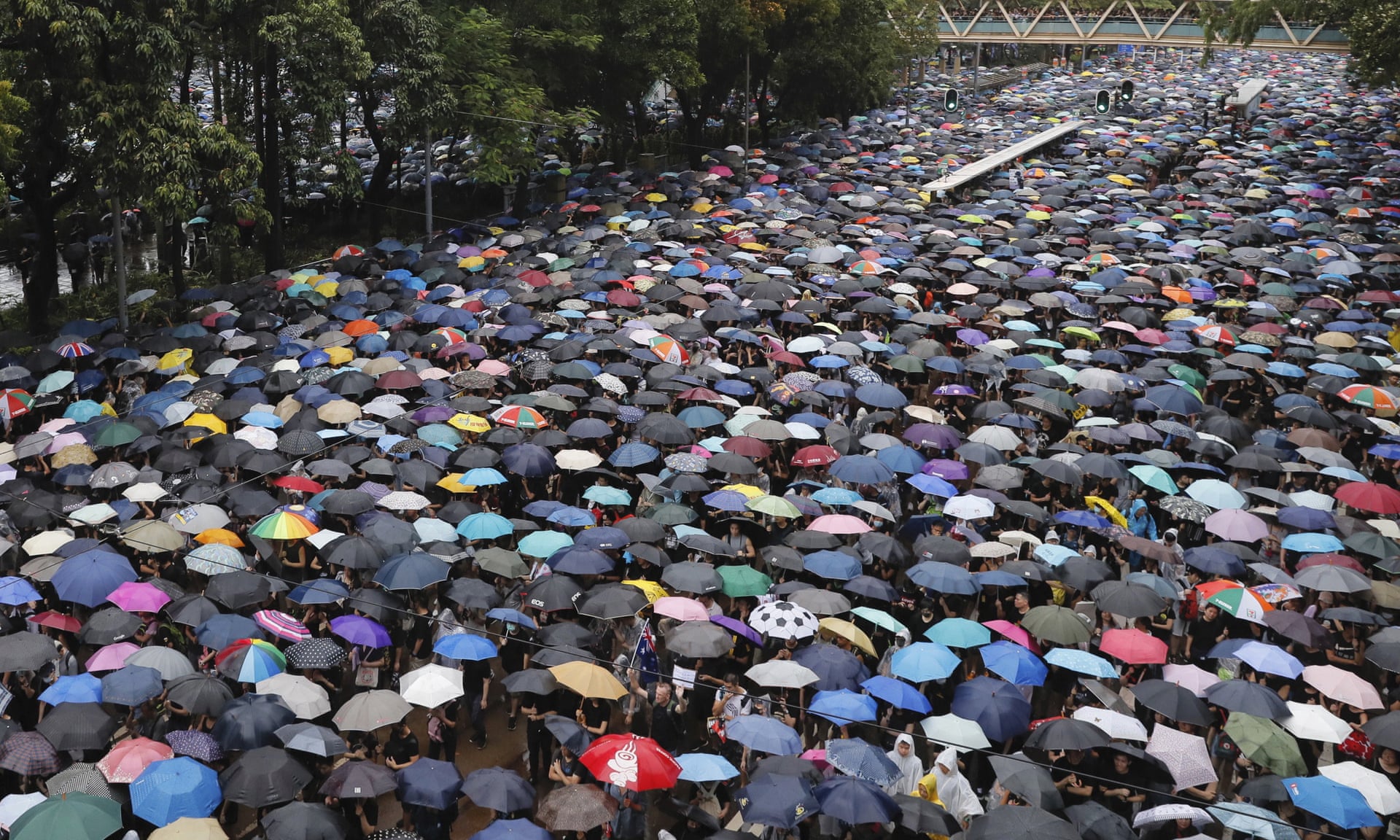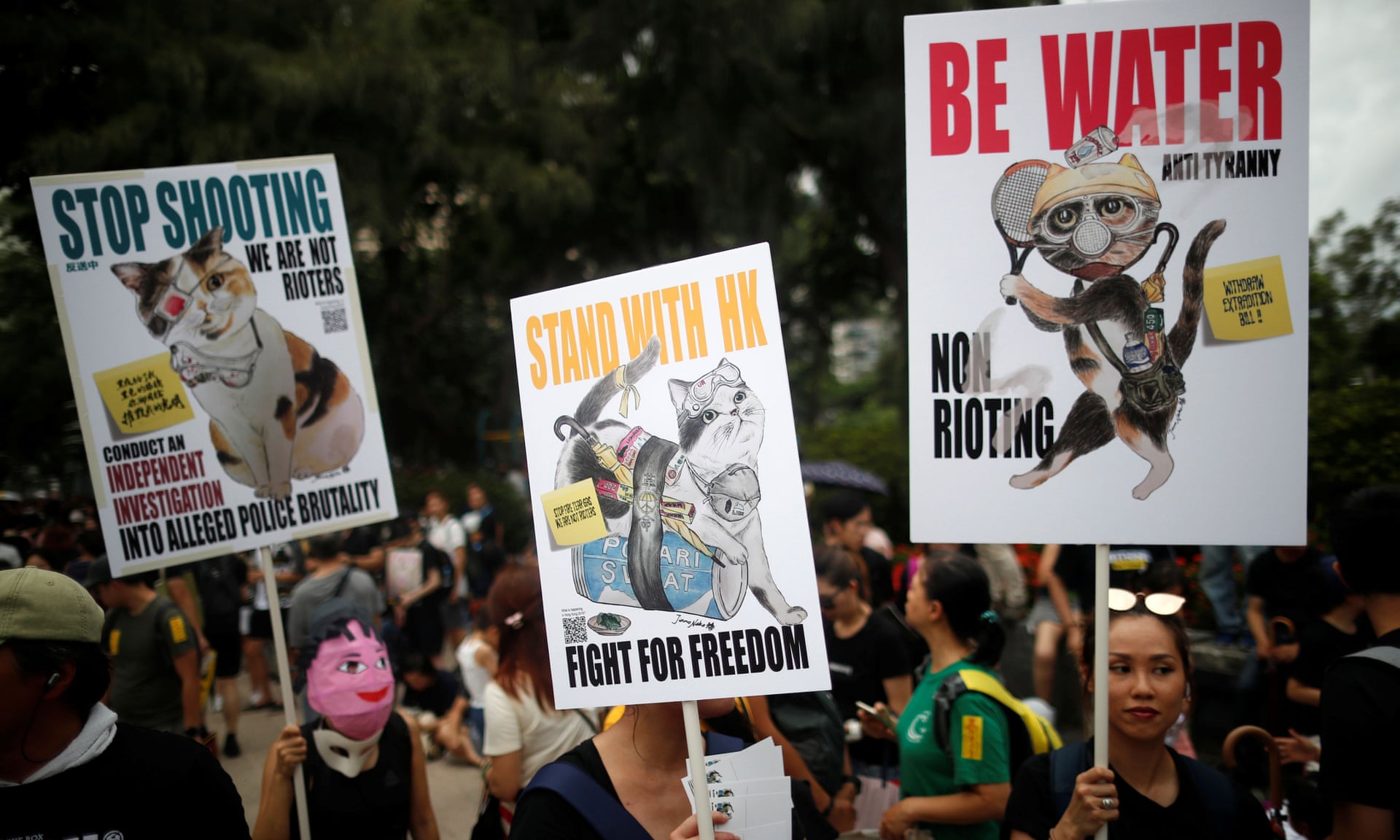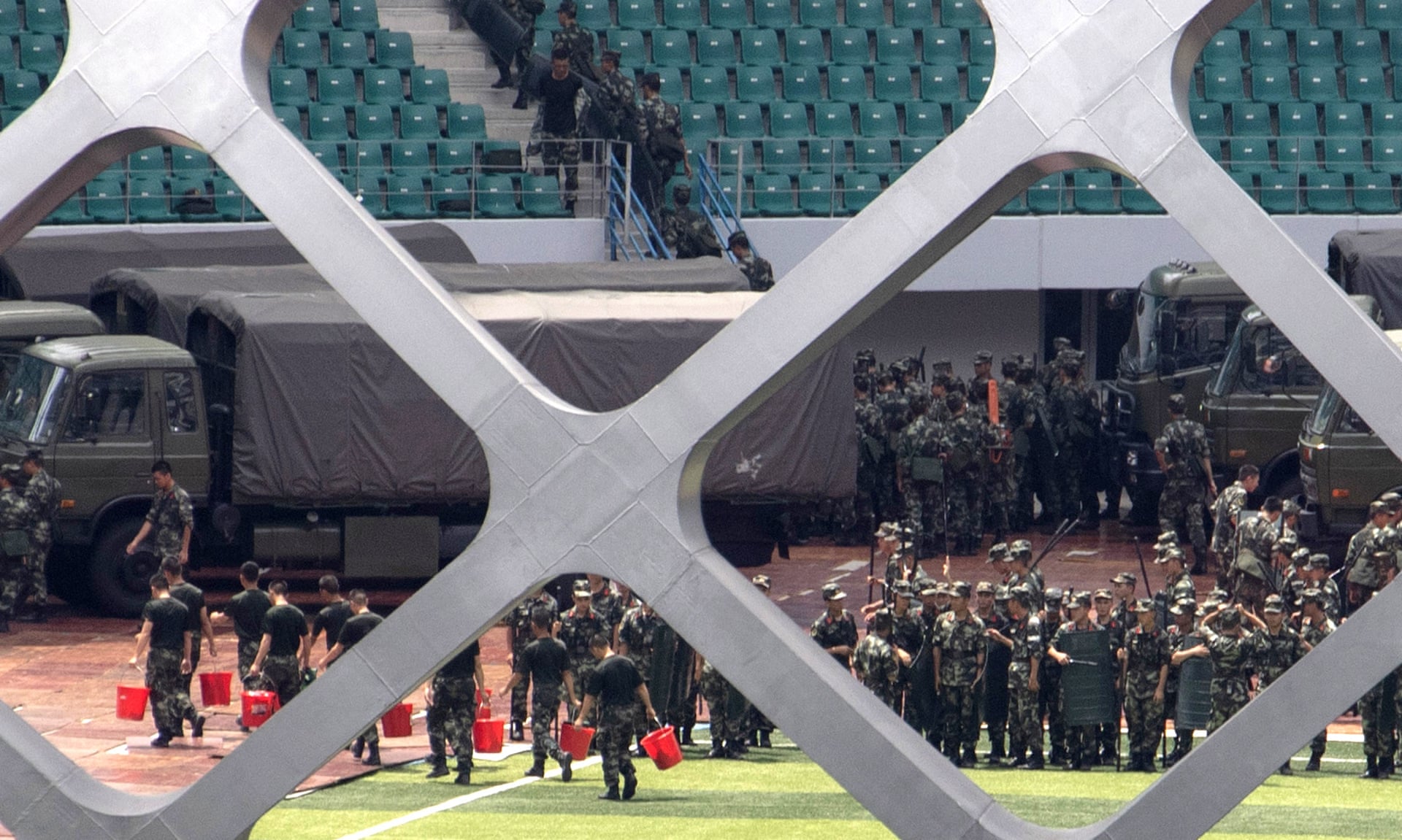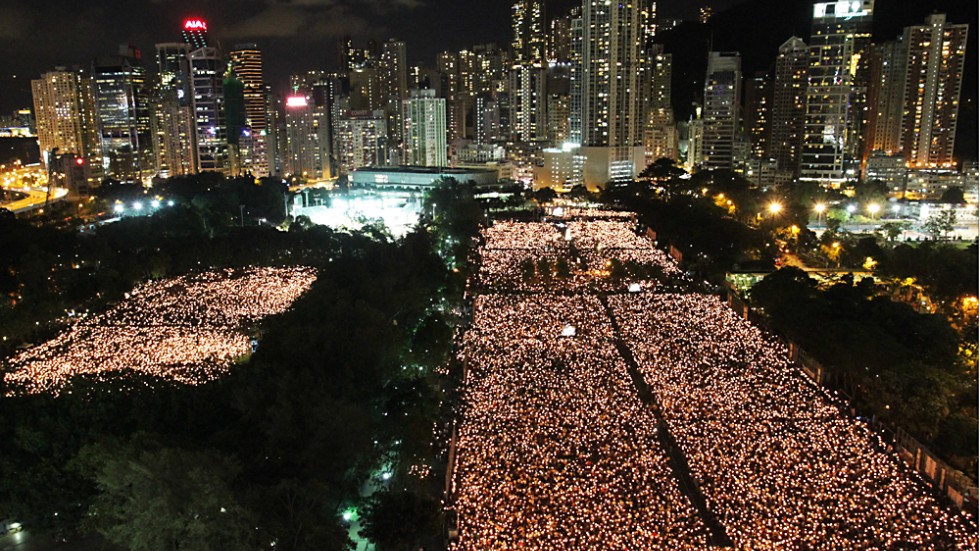A quarter of the population fill downtown park and surrounding streets
By Verna Yu and Lily Kuo in Hong Kong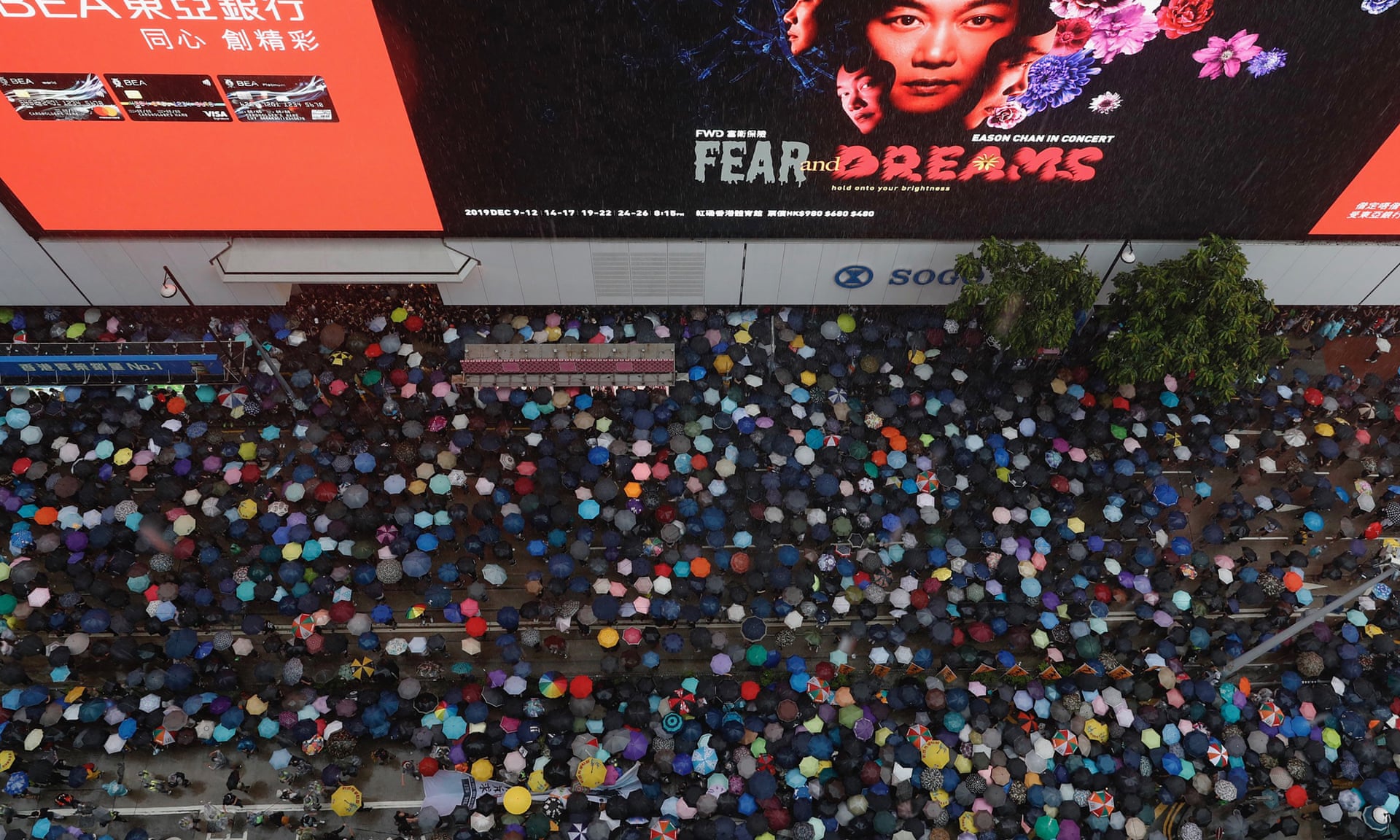
Demonstrators carry umbrellas as they march along a street in Hong Kong on Sunday in defiance of a police ban.
An estimated 1.7 million people in Hong Kong – a quarter of the population – defied police orders to stage a peaceful march after a rally in a downtown park, after two months of increasingly violent clashes that have prompted severe warnings from Beijing and failed to win concessions from the city’s government.
Huge crowds filled Victoria Park on Sunday afternoon and spilled on to nearby streets, forcing police to block traffic in the area.
Huge crowds filled Victoria Park on Sunday afternoon and spilled on to nearby streets, forcing police to block traffic in the area.
Torrential rain came down an hour into the rally, turning the park into a sea of umbrellas.
At the same time, protesters walked towards Central, the heart of Hong Kong’s business district, and surrounded government headquarters.
Police had turned down a plan for Sunday’s march submitted by the Civil Human Rights Front group and gave permission only for a rally in the park.
Police had turned down a plan for Sunday’s march submitted by the Civil Human Rights Front group and gave permission only for a rally in the park.
Those defying the ban risked being charged with unlawful assembly, which can lead to up to five years in prison.
“Stand with Hong Kong! Fight for freedom!” protesters shouted at the rally.
Throughout the afternoon, streets around Victoria Park were so densely packed that the march frequently came to a complete standstill.
“Stand with Hong Kong! Fight for freedom!” protesters shouted at the rally.
Throughout the afternoon, streets around Victoria Park were so densely packed that the march frequently came to a complete standstill.
Some protesters walked on to a flyover near the park as the crowds on the streets were unable to move.
Protesters were orderly but burst into choruses of slogans as they waited to move forward.
Protesters were orderly but burst into choruses of slogans as they waited to move forward.
“Hong Kong people, go!”, “Reclaim Hong Kong, revolution of our era!” they chanted.
Observers saw Sunday’s rally, the largest in weeks, as a test of the movement’s momentum and public support as tensions between police and protesters have escalated.
“Even though the weather was so bad, even in the face of threats of the People’s Liberation Army and water cannons, Hong Kong people never back down,” said Wong, 21, a university student.
Wong did not expect this to be the last major rally.
Observers saw Sunday’s rally, the largest in weeks, as a test of the movement’s momentum and public support as tensions between police and protesters have escalated.
“Even though the weather was so bad, even in the face of threats of the People’s Liberation Army and water cannons, Hong Kong people never back down,” said Wong, 21, a university student.
Wong did not expect this to be the last major rally.
“For as long as the government doesn’t respond, there will only be more large-scale protests.”
US president Donald Trump said on Sunday he wanted to see the crisis resolved peacefully, warning against any hardline crackdown.
“I’d like to see Hong Kong worked out in a very humanitarian fashion … I hope Xi Jinping can do it… he sure has the ability, I can tell you that.
“I think it’d be very hard to deal if they do violence, I mean, if it’s another Tiananmen Square,” Trump told reporters in New Jersey.
US president Donald Trump said on Sunday he wanted to see the crisis resolved peacefully, warning against any hardline crackdown.
“I’d like to see Hong Kong worked out in a very humanitarian fashion … I hope Xi Jinping can do it… he sure has the ability, I can tell you that.
“I think it’d be very hard to deal if they do violence, I mean, if it’s another Tiananmen Square,” Trump told reporters in New Jersey.
“I think it’s a very hard thing to do if there’s violence.”
Protesters holding umbrellas march in an anti-government rally in Causeway Bay, Hong Kong.
Organisers of the rally, who estimated that 1.7 million people turned up at the park and in the nearby Causeway Bay and Tin Hau areas, said many more were unable to get there.
Train services to the metro stations near the park were suspended intermittently throughout the day due to the huge numbers of people.
The crowd was a mix of young protesters, families and elderly residents.
The crowd was a mix of young protesters, families and elderly residents.
Parents walked alongside small children.
By early evening, protesters occupied a six-lane road outside the government in Admiralty, shining lasers at the building and the nearby People’s Liberation Army garrison and yelling insults at the police.
By early evening, protesters occupied a six-lane road outside the government in Admiralty, shining lasers at the building and the nearby People’s Liberation Army garrison and yelling insults at the police.
After convoys of police vans were seen entering the government complex, protesters called for a retreat and the crowd gradually dispersed.
Protesters faced heavy rain during Sunday’s rally.
A statement from the force late on Sunday condemned the protesters and accused them of paralysing traffic in the area.
As protesters marched past the police headquarters, they chanted, “Return the eye!” referring to a recent incident in which a young woman’s eye was badly injured during the protests.
Both the government and police headquarters were surrounded by giant water-filled barricades.
In the early evening, a number of protesters ignored the organisers’ advice to leave after reaching Central and continued to march west towards the Chinese government’s liaison office, where previous protests have ended in violent clashes.
In the early evening, a number of protesters ignored the organisers’ advice to leave after reaching Central and continued to march west towards the Chinese government’s liaison office, where previous protests have ended in violent clashes.
Dozens of riot police officers armed with shields and guns were seen patrolling the area.
People march during a rally to demand democracy and political reforms in Hong Kong.
Organisers insist that the Hong Kong government must stop using the police force to suppress them and respond to their five political demands, including the complete withdrawal of the now suspended extradition bill – under which individuals can be sent to China for trial – the setting up of an independent body to investigate police violence, and universal suffrage (the free election of Hong Kong’s leaders).
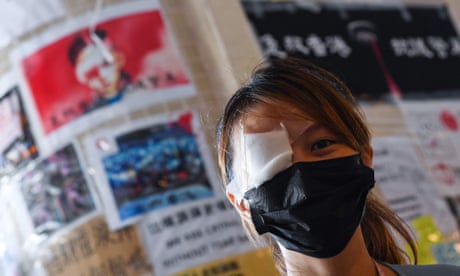
'An eye for an eye': Hong Kong protests get figurehead in woman injured by police.
A late-night government statement said although the protests were peaceful, they caused inconvenience to the community.
Organisers insist that the Hong Kong government must stop using the police force to suppress them and respond to their five political demands, including the complete withdrawal of the now suspended extradition bill – under which individuals can be sent to China for trial – the setting up of an independent body to investigate police violence, and universal suffrage (the free election of Hong Kong’s leaders).

'An eye for an eye': Hong Kong protests get figurehead in woman injured by police.
A late-night government statement said although the protests were peaceful, they caused inconvenience to the community.
The statement said it was “most important” to restore social order and “the government will begin sincere dialogue with the public, mend social rifts and rebuild social harmony when everything has calmed down”.
The Civil Human Rights Front had earlier called for a “peaceful, rational and non-violent” rally and online posts urged “self discipline and calmness” after 10 weeks of intensive protests, many of which have ended in violent clashes as police increasingly employed teargas and rubber bullets to disperse the crowds.
The Civil Human Rights Front had earlier called for a “peaceful, rational and non-violent” rally and online posts urged “self discipline and calmness” after 10 weeks of intensive protests, many of which have ended in violent clashes as police increasingly employed teargas and rubber bullets to disperse the crowds.
Chinese paramilitary police officers go through drills at the Shenzhen Bay stadium on Sunday.
“China is taking over Hong Kong. Our society has no justice and no future. We’re just making a last-ditch attempt to do something amid our despondency,” said Carol Lui, a teacher in her 30s.
“Hong Kong is dying anyway, so we are just fighting to our last breath.”
Hong Kong had its first teargas-free Saturday for weeks after three separate rallies took place in Kowloon.
Hong Kong had its first teargas-free Saturday for weeks after three separate rallies took place in Kowloon.
The marches this Saturday and Sunday marked the 11th weekend of protests in Hong Kong.
Tensions reached a new level during the past week.
Tensions reached a new level during the past week.
Following last weekend’s violent clashes with police, protesters occupied Hong Kong’s airport.
Over the past week, state media outlets have published videos showing armoured Chinese troop carriers purportedly driving into Shenzhen, the south-eastern state that borders Hong Kong.
Chinese officials have also released a series of threatening statements about Hong Kong’s protesters, with one claiming “terrorism” was emerging in the city after flights were cancelled.
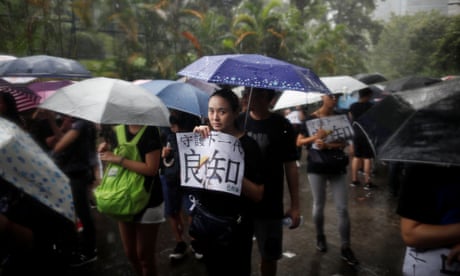
Hong Kong: three rallies mark 11th weekend of protests
Despite the call for peace on Sunday, some protesters have warned that the protests could turn violent again if the government continues to ignore their demands.
“Violent escalation is an extreme measure … but if it is effective, we would continue, because we need to try all means to attract attention to our cause,” said a 25-year-old engineer wearing full protective gear who gave his surname as Fan.
Chinese officials have also released a series of threatening statements about Hong Kong’s protesters, with one claiming “terrorism” was emerging in the city after flights were cancelled.

Hong Kong: three rallies mark 11th weekend of protests
Despite the call for peace on Sunday, some protesters have warned that the protests could turn violent again if the government continues to ignore their demands.
“Violent escalation is an extreme measure … but if it is effective, we would continue, because we need to try all means to attract attention to our cause,” said a 25-year-old engineer wearing full protective gear who gave his surname as Fan.
